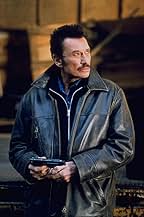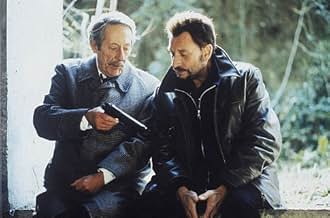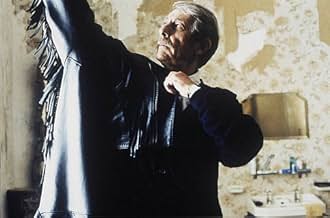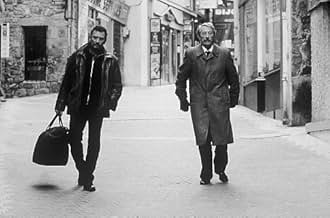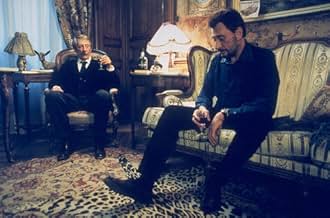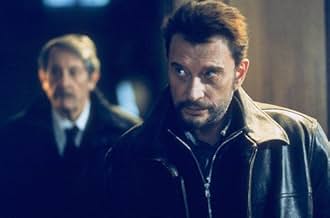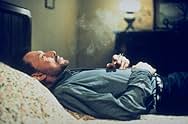L'homme du train
- 2002
- Tous publics
- 1h 30m
IMDb RATING
7.1/10
7.7K
YOUR RATING
A man steps off a train into a French village awaiting the day when he will rob the town bank. He meets a retired poetry teacher striking up a strange friendship and explore the road not tak... Read allA man steps off a train into a French village awaiting the day when he will rob the town bank. He meets a retired poetry teacher striking up a strange friendship and explore the road not taken, each wanting to live the other's life.A man steps off a train into a French village awaiting the day when he will rob the town bank. He meets a retired poetry teacher striking up a strange friendship and explore the road not taken, each wanting to live the other's life.
- Awards
- 8 wins & 10 nominations total
- Director
- Writer
- All cast & crew
- Production, box office & more at IMDbPro
Featured reviews
European cinema again; again originality, again stuff almost unique that I'm afraid I'll never find something similar. Here, the story about two people, and those two alone, and it is not easy two keep up ninety minutes developing their experiences. You need to have a good eye, pace, and respect for your characters.
These characters are Milan (Johnny Hallyday), a thief; and Monsieur Manesquier (Jean Rochefort), a retired literature professor. Their differences make their encounters scary. One, an old man who likes to talk and is fascinated by this mysterious obscure man in strange clothes; Manesquier enters Milan's room and imagines to be in a fantasy world he couldn't live in.
Milan is quiet and soft talking, but induces the old man into the drinking again, into excitement and adventures; and after meeting his pals he even doubts about carrying on with the only thing he came to do to this town: rob a bank. He reaches the limit of giving a literature lesson to one of Manesquier's pupils.
The camera is in love with them both, and presents each one in an original way when they are on screen. Different colors, postures, followings. Each one might hide something; there's a past, but that's not what this story that wanders through coincidences and casualties of life wants to show.
A simple aspirin, a glass of water; what can that lead to. The anxiety of a man to be part of something he never lived, on one side. On the other side the silence and intrigue of the little conversation. The glasses of wine, the lunches that seem to say much but are saying almost nothing about the characters.
The music, by Pacscal Estève, is very important to the film; giving to it a touch of Westerns style, playing to represent the state of mind and humor of the characters when we see them, or simply, not playing at all; and that's very good sometimes. Ivan Maussion's production design is also a good point for that matter, with his deserted streets and lonely places.
The screenplay results to be cultured and very intelligent. Patrice Leconte's frequent writing collaborator leaves everything in his character's hands; because the words are his. Also frequently cast by Leconte, Jean Rochefort's delivery is impressing in his measured role, that requires little but well done. It's Johnny Hallyday, however, the one who steals, or shines in his loneliness. With all those looks and his face, always full of hidden things.
Metaphors join us again, in the movie; for us to interpret. I tried, and everyone will, but I say: thank Europe for these movies; it's worth and more a kind of pleasure to watch them!
These characters are Milan (Johnny Hallyday), a thief; and Monsieur Manesquier (Jean Rochefort), a retired literature professor. Their differences make their encounters scary. One, an old man who likes to talk and is fascinated by this mysterious obscure man in strange clothes; Manesquier enters Milan's room and imagines to be in a fantasy world he couldn't live in.
Milan is quiet and soft talking, but induces the old man into the drinking again, into excitement and adventures; and after meeting his pals he even doubts about carrying on with the only thing he came to do to this town: rob a bank. He reaches the limit of giving a literature lesson to one of Manesquier's pupils.
The camera is in love with them both, and presents each one in an original way when they are on screen. Different colors, postures, followings. Each one might hide something; there's a past, but that's not what this story that wanders through coincidences and casualties of life wants to show.
A simple aspirin, a glass of water; what can that lead to. The anxiety of a man to be part of something he never lived, on one side. On the other side the silence and intrigue of the little conversation. The glasses of wine, the lunches that seem to say much but are saying almost nothing about the characters.
The music, by Pacscal Estève, is very important to the film; giving to it a touch of Westerns style, playing to represent the state of mind and humor of the characters when we see them, or simply, not playing at all; and that's very good sometimes. Ivan Maussion's production design is also a good point for that matter, with his deserted streets and lonely places.
The screenplay results to be cultured and very intelligent. Patrice Leconte's frequent writing collaborator leaves everything in his character's hands; because the words are his. Also frequently cast by Leconte, Jean Rochefort's delivery is impressing in his measured role, that requires little but well done. It's Johnny Hallyday, however, the one who steals, or shines in his loneliness. With all those looks and his face, always full of hidden things.
Metaphors join us again, in the movie; for us to interpret. I tried, and everyone will, but I say: thank Europe for these movies; it's worth and more a kind of pleasure to watch them!
This is a beautifully acted and written story of two older men dealing with regret. The dialogue is witty, but never self-conscious and the performances are great. Johnny Hallyday (The Elvis of France!) is especially surprising in his role as the bank robber at the end of his career.
The story is well paced, and unlike a lot of French movies, it's not just a bunch of talking heads, but a real story with compelling characters. The two strangers meet by hazard and forge a close relationship, each trading bits and pieces of their lives. The scene where Jean Roquefort gives Johnny his slippers is a literal manifestation of their efforts to change their lives, albeit late in life.
A lovely little film from beginning to end!
The story is well paced, and unlike a lot of French movies, it's not just a bunch of talking heads, but a real story with compelling characters. The two strangers meet by hazard and forge a close relationship, each trading bits and pieces of their lives. The scene where Jean Roquefort gives Johnny his slippers is a literal manifestation of their efforts to change their lives, albeit late in life.
A lovely little film from beginning to end!
We know this film from childhood, but the child has grown. Here we are in a provincial French city when the cowboy rides in on the iron train to transform the life of a citizen, unexpectedly, profoundly.
Jean Rochefort, with his great face of character, about to go for major surgery, a three vessel bypass, a wifeless man of regrets, a retired teacher of literature to secondary students, is about to meet his fantasy: Johnny Hollyday (the Elvis of France?) who plays a bank robber about to perform his retirement job. Meeting by apparent chance, though clearly pre-ordained, the fantasies of the lonely, anxious teacher whose love of poetry might be his most tender trait in an otherwise ruthlessly real view of the world, are set in motion. Hollyday becomes his unexpected guest...the lone hotel is closed for the season...and an excitement comes to Rochefort's life. The man has guns. There is a picture of him looking terribly western in his leather jacket, the enigmatic stranger/cowboy in the mythos of his host. Ah, to be that man, to fire that gun, to live that life of dark adventure.
It goes on to its meaningful end, not told here except to say that the last scene may be an error, a prolongation that was unnecessary and added nothing to the power of the film, nor detracted from the marvelous performance of Rochefort, who can do no wrong with any role, or Hollyday, whose acting turn here is perfect in the Robert Mitchum noir sense, but tinged with an old-world tiredness that is quite moving. All this with fine subsidiary acting, a perfectly murky Simenonoish setting, and Schubert's melancholic sounds. Ah, bon. Tres, tres bon.
Jean Rochefort, with his great face of character, about to go for major surgery, a three vessel bypass, a wifeless man of regrets, a retired teacher of literature to secondary students, is about to meet his fantasy: Johnny Hollyday (the Elvis of France?) who plays a bank robber about to perform his retirement job. Meeting by apparent chance, though clearly pre-ordained, the fantasies of the lonely, anxious teacher whose love of poetry might be his most tender trait in an otherwise ruthlessly real view of the world, are set in motion. Hollyday becomes his unexpected guest...the lone hotel is closed for the season...and an excitement comes to Rochefort's life. The man has guns. There is a picture of him looking terribly western in his leather jacket, the enigmatic stranger/cowboy in the mythos of his host. Ah, to be that man, to fire that gun, to live that life of dark adventure.
It goes on to its meaningful end, not told here except to say that the last scene may be an error, a prolongation that was unnecessary and added nothing to the power of the film, nor detracted from the marvelous performance of Rochefort, who can do no wrong with any role, or Hollyday, whose acting turn here is perfect in the Robert Mitchum noir sense, but tinged with an old-world tiredness that is quite moving. All this with fine subsidiary acting, a perfectly murky Simenonoish setting, and Schubert's melancholic sounds. Ah, bon. Tres, tres bon.
"Man on the train", directed by Patrice Leconte is "intimiste" French cinema at its best. It tells the story of a chance encounter and ensuing friendship between Milan, a gangster who is coming to a small French town to rob a bank and Manesquier, a retired professor of poetry who has lived there his whole life. The two protagonists could not be more different and yet, each one becomes fascinated by the other's life. Soon, Milan tries on slippers and Manesquier is shooting a gun at soda cans. Was Milan's life wasted because he never had the strength to fill his life with the structure he so desires? Was Manesquier's life wasted because he never had the strength to escape the structured life he so loathes? Will they go all the way and actually exchange lives? The movie is extremely well directed and photographed, with grainy blueish colors that support each character's melancholy. The script is tight and leaves room for silent moments which are as important to the story as the dialogue (a concept unknown in Hollywood). Every word has a deeper meaning than its litteral one. In one of the best scenes of the movie, the elegant poetry professor Manesquier puts on Milan's leather jacket and stands in front of the mirror saying in English: "The name is Earp...Wyatt Earp". But in the end, what makes the movie such a gem is the talent of the two lead actors who, like their characters, are such extreme opposites that their screen relationship could easily have ended up devoid of any chemestry. Jean Rochefort is an intellectual and one of France's greatest and most subtle living actors. Johnny Hallyday is the uneducated, over-the-top rock'n roll singer and social icon who has monopolized the #1 spot in French music charts since 1960 and who has been derided by the French intelligentsia ever since. Until the movie, Rochefort himself was no fan of Hallyday, though he likes to say with a grin: "Madame Rochefort, on the other hand...". They have since become friends. It, reportedly, took a lot of effort by Rochefort and Leconte to make Hallyday comfortable enough to act opposite Rochefort whom he saw as a towering icon. They most certainly succeeded since, in the end, it is the surprising subtelty of Hallyday's performance that makes the movie so poignant. Despite the botox injections and the face lifts, his Mount Rushmore face looks like that of a man who has been to hell and back a few hundred times. He has such presence and charisma that you can't take your eyes off him whenever he appears on the screen. Though he plays Milan with a minimalist approach, both in demeanor and delivery, he manages to display the most intense emotions in a simple grin, a gesture or a stare. The way he smokes Manesquier's pipe while explaining Balzac's "Eugenie Grandet" (which he has obviously never read) to a private student of Manesquier will make you chuckle. The way he looks at Manesquier when he leaves his house at the end of the movie will simply break your heart... "Man on the train" is a gentle, tender film which asks big questions in little ways. Let's pray it never gets remade in Hollywood...
1st watched 8/9/2003 - 7 out of 10(Dir-Patrice Leconte): Wonderful drama about two men who want to switch places in life because each is bored of what their life has become. One is a bank robber, and the other is a retired poetry teacher. The bank robber is plain tired of the excitement and the other wants excitement in his life. The retired poetry teacher also has an upcoming triple-bypass heart surgery that lends to his aggressiveness about trying out the other lifestyle. Like many French dramas, this movie takes it's time and explores the characters and let's us get to know them. This is `so' lacking in most American films these days and therefore this is a breath of fresh air for those who are okay with reading subtitles. While watching this movie you get the feeling that you're watching two `real' people interacting despite their differences. Do they ever switch places? Well, sort of but like other French dramas `reality' is where the film stays for the most part. The ability for the characters to understand and accept each other is `just' wonderful and makes a wonderful statement about how we should `all' interact and I think this is what makes this film remarkable.
Did you know
- TriviaJean Rochefort died in October 2017. Two months later, Johnny Hallyday died.
- ConnectionsReferenced in 69 minutes sans chichis: Johnny Hallyday (2015)
- SoundtracksImpromptu in A-flat Major, Op. 142 No. 2 (D. 935)
Written by Franz Schubert
- How long is Man on the Train?Powered by Alexa
Details
Box office
- Gross US & Canada
- $2,542,020
- Opening weekend US & Canada
- $41,138
- May 11, 2003
- Gross worldwide
- $7,727,906
- Runtime1 hour 30 minutes
- Color
- Sound mix
- Aspect ratio
- 2.35 : 1
Contribute to this page
Suggest an edit or add missing content



